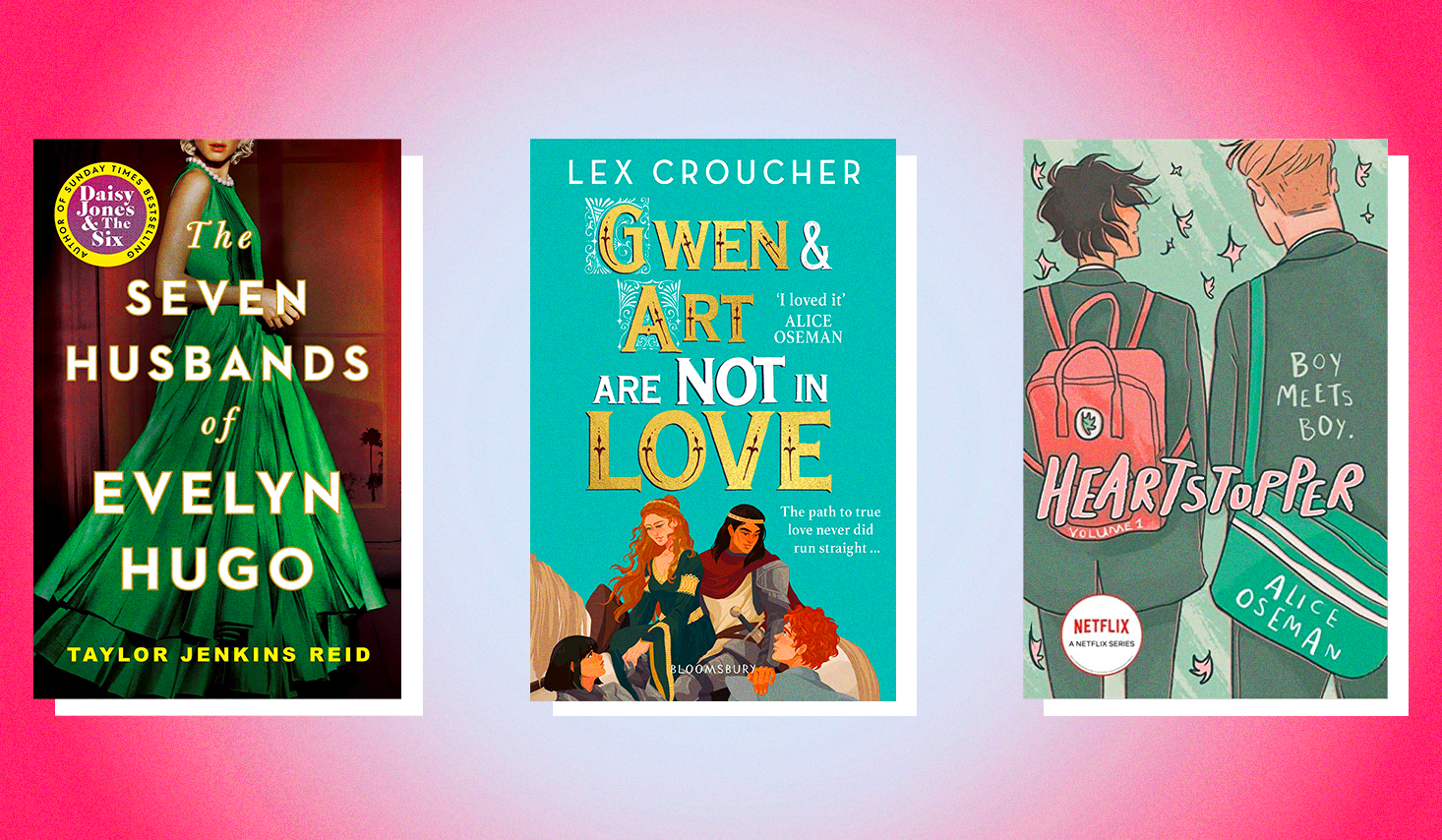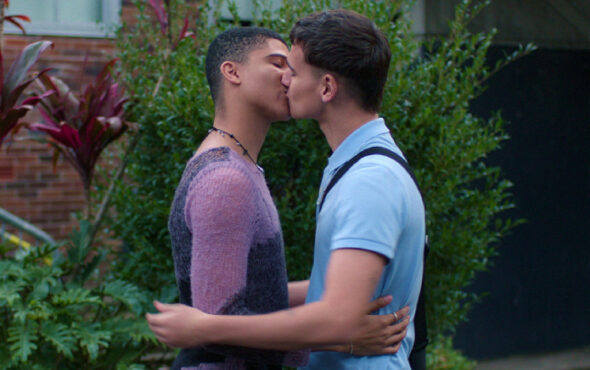
You’ve likely heard of TikTok, an online platform known for its viral dancing challenges and never-ending cycle of fashion trends. But, in the world of BookTok, things are a little different. Here, there are endless fun, quick-paced videos of readers sharing their favourite queer reading recommendations, hoping to draw in a whole new community.
The prevalence of digital reading hubs is nothing new. In fact, before TikTok, there was Booklr for book lovers on Tumblr and Bookstagram for Instagram. While these online bubbles gave way to their own communities, few have done it quite like queer BookTok. In the last couple of years, raking in over 113.5B views, BookTok has faced a boom which has not only affected publishers, but authors, sales and, of course, readers.
A report from NPD BookScan, which tracks the publishing market, revealed that 2021’s biggest gains in LGBTQ+ fiction came from YA fiction titles, with sales growing by 1.3 million units over 2020. Adam Silvera’s LGBTQ+ favourite They Both Die at the End, which made the rounds on BookTok in 2020, earned the most gains. But, it doesn’t just stop there. In fact, the virality of these books is proving to be lucrative too. US print book sales of LGBTQ+ fiction reached nearly 5 million units in 2021, doubling 2020 sales. While the UK publishing’s total income reached a new high of £6.7bn in 2021.
So, where is the unstoppable success of BookTok coming from? Well, for one, the number of openly LGBTQ+ Americans has doubled over the past decade. Adult LGBTQ+ fiction, in the US, grew by more than one million units in 2021 with hit titles like Casey McQuinston’s One Last Stop and Ocean Vuong’s On Earth We’re Briefly Gorgeous coming out on top, earning spots on the New York Times bestseller list. As audiences continue to grow, so does demand. The largest rise in LGBTQ+ literature has stemmed from the Young Adult (YA) genre. And, currently, 1 in 5 adult members of Gen Z self-identify as part of the queer community.
Since its launch, TikTok has become a sanctity of queer education, creativity and escape. With the LGBTQ+ community growing in size, it’s no surprise the term “queer BookTok” has pulled in over 423.6M views. But, it’s not just that – there’s also a bigger cultural shift at play. LGBTQ+ content, specifically TV shows, has established a trend of mistreatment when it comes to queer characters and plotlines. Netflix has cancelled countless fan-favourite series. The “bury your gays” trope, where you can expect your favourite queer character to die, has continued to stick around. But, these new-wave LGBTQ+ inclusive books steer away from that. While, yes, your gutsy sci-fi reads will probably have a stab at death, it’s likely the protagonist won’t wound up dead mid-book. The golden ticket, however, is queer rom-coms. Harmless and entertaining, this sub-genre promises nothing but the familiar romance fluff we’re eager to settle for.
Charlotte Moore, a Commissioning Editor at Penguin Random House, has seen the queer TikTok rise as a positive: “It’s so incredibly exciting! [LGBTQ+] writers and readers have always been there, but BookTok has created a space for passionate readers to share and champion authors that might have previously flown under the radar.”
From an industry perspective, Charlotte views TikTok as a constructive route to help improve diversity within upcoming titles. “Creators aren’t afraid to share what they want from the publishing industry and it feels like readers, authors and publishers are all working together in a far more collaborative way,” she tells GAY TIMES. “I’ve seen readers give feedback about stories directly to publishers and authors, as well as authors sharing more about their writing process and routes into traditional publishing. I’ve also definitely seen a rise in Sapphic stories and I think we’ll see a lot more stories with brilliantly realised non-binary leads and trans main characters in the near future.”
Joel Rochester, a Gen Z BookTocker, has seen the impact TikTok has had on creatives and the interest surrounding queer book titles. “TikTok has definitely influenced the popularity of queer titles, take Heartstopper and They Both Die In The End, for instance. Both titles rose dramatically in popularity when exposed to the TikTok algorithm,” Joel says. “I see the influence of BookTok as wholly positive, although there is no denying that it can be negative sometimes, as with any community. The many people I’ve met through Tiktok have all been really nice, supportive and amazing. Plus, everyone is so eager to discuss and talk about bookish topics!”
For many, BookTok can be a gateway into a new world of queer reading. Once an algorithm latches on to your likes, your unique “For You Page” will be flooded with new videos loaded with suggested titles. Major titles such as Taylor Jenkins Reid’s The Seven Husbands of Evelyn Hugo (published in 2017) and Madeline Miller’s The Song of Achilles (published in 2011) made a splash for exactly this reason. Both titles went viral years after their initial debuts. However, the algorithm isn’t just breathing new life into older titles. Newer titles such as Cinderella Is Dead by Kalynn Bayron and I Kissed Shara Wheeler by Casey McQuiston have also been boosted by BookTok, proving it’s all just a digital lottery.
Joy*, a Gen Z content creator, is not out to their parents and runs a successful BookTok account. For them, watching the online Black BookTok reading community blossom has been incredible to see. “With BookTok being so diverse and overall welcoming, it’s provided a space for readers to explore their identity without judgement, but more with encouragement,” they tell GAY TIMES. “The response to Heartstopper was insane and the way it has positively impacted the communities has been amazing.”
Author Lex Croucher says that word of mouth has helped for smaller titles, but TikTok has enabled a reach that writers could not imagine. Their upcoming YA romance title Gwen & Art Are Not In Love is a Heartstopper-meets-A Knight’s Tale in a queer mediaeval-style rom-com. “Queer books have not traditionally had big marketing campaigns or publicity pushes because they were considered risky or niche,” Lex explains. “Platforms like TikTok mean that readers looking for those books can find them and shout about them, and the huge amount of interest has completely debunked the idea that there aren’t enough readers out there who want to read these stories – these are life- and career-changing numbers for authors”.
However, while BookTok has created an uplifting surge of LGBTQ+ literature, Lex is mindful of how the successes of a booming industry can potentially limit those hoping to get in. “If you look at stats about who’s getting book deals, I think publishing is still overwhelmingly white, cis, straight,” Lex says. “I hope [BookTok] is having a positive impact, but until we see the numbers change and actually stay that way, with publishers committed to supporting diverse talent (both internally and externally) in the long run, I don’t think we can say for certain that things have changed.”
While BookTok definitely has its drawbacks, particularly the much-needed focus on Black, Brown and minority voices, its influence is unrivalled. From inspiring BookTok-related displays in Waterstones to pushing publishers to partner with online creators, TikTok has given way to a whole new influencer era. In fact, many publishers, including Penguin Random House and Simon & Schuster, have their own TikTok channels. With their own accounts (and influence), these publishing houses are able to go direct to their audience to promote their next big titles.
The LGBTQ+ BookTok boom is largely a great thing. Authors across the globe are getting the opportunity to be in the spotlight and have their work appreciated. First-time writers and self-published authors are also getting a shot too. Equally, a new wave of readers are gaining insight into different genres, titles, and queer stories. However, the joyous uptick of queer literature hasn’t come without a cost.
A recent report from the nonprofit group PEN America found that of the 1,600 books banned in over 5,000 schools in the last school year, 41% of these titles were targeted due to LGBTQ+ content. Jonathan Friedman, the director of anti-censorship and education at PEN America, told NBC News that conservative groups seek out books with LGBTQ+ content on the internet and then add them to lists of books deemed to have inappropriate content in them. “They complain about the books online, the books go on a list, the list takes on a sense of legitimacy, and then it being on the list leads a school district to react to that list and take it seriously,” Friedman said.
The ban on these books risks removing access to LGBTQ+ books that young readers can truly benefit from. With certain books flagged as a concern to young American adults, this culture of censorship threatens the child-friendly queer content that growing audiences may identify with. In moments like this, online spaces like BookTok can offer alternative education and exposure to young readers and adults.
Daniel Harding, the author of Gay Man Talking, has seen the “accessibility to queer work” online as a game-changer. “We can’t grow, learn or develop, without reading and respecting other people’s stories and journeys. I’ll always be here for it. I think the world needs (and wants) queer literature right now. It’s present and people need to educate themselves. Parents, allies, or other people within our own letters, we need to learn and grow. So keep them coming.” BookTok isn’t the first online space to tap into the world of reading, so maybe it’s unfair to attribute this reading virality to one app. But, there’s one thing for sure — queer BookTok has made queer people and communities feel visible in a whole new way. So, can TikTok be really that bad – Pulkit Srivastava, a huge Heartstopper fan, admits he found his “all-time favourite novels” from BookTok and Bookstagram.
For Pulkit, queer BookTok has helped reaffirm his identity and make new friends. “It honestly feels amazing. The rise of queer literature and stories validates my existence and my feelings,” he tells GAY TIMES. “After reading Heartstopper, I shared my thoughts with so many people online. Now, a group of 4-5 of us Heartstopper fans connect once every two weeks. We have each other, and I am grateful for the community I’ve found.”
*Some names have been changed to protect the identity of contributors



